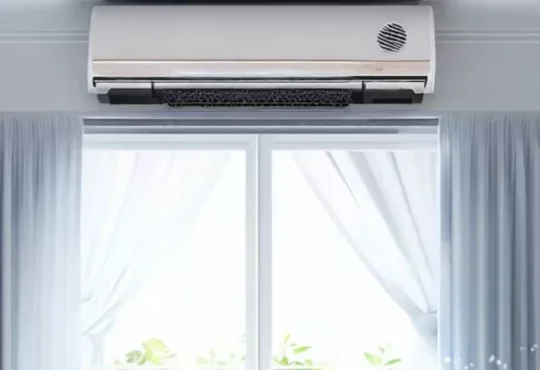Many people are concerned about indoor air pollution, which has increased demand for air purifiers like the Healthmate Jr Air Purifier. These devices filter out toxins and improve air quality in enclosed environments. However, to achieve peak performance, it is critical to grasp the significance of updating your air purifier’s filters regularly. In this blog post, we will look at why filter replacement is essential and recommend how frequently you should replace them.
The Importance of Filter Replacement
Air purifiers pull in air and filter it to remove particles like dust, pollen, pet hair, mold spores, and even volatile organic compounds (VOCs). These filters become saturated with collected contaminants over time, diminishing their efficiency. Failure to replace filters on time might reduce air purifier efficiency and degrade air quality.
Regular filter change ensures that your air purifier performs optimally and effectively removes hazardous particles. Clean filters also help your air purifier last longer by minimizing clogging and loading the device’s internal components less.
Factors Influencing Filter Replacement Frequency
The frequency with which you should replace the filters in your air purifier depends on several factors. Understanding these characteristics will allow you to identify the best filter replacement plan for your specific needs. The following are some essential elements that determine filter replacement frequency:
Air Quality
The air quality in your environment has a considerable impact on filter longevity. If you live in a high-pollution location, such as an industrial zone, a construction site, or a high-traffic area, the filters in your air purifier may become clogged more rapidly. Furthermore, if you reside in an area prone to wildfires or seasonal pollen allergies, the filters may need to be replaced more frequently to maintain optimal air filtration.
Household Conditions
The frequency with which you replace your filters is also affected by the environment in your home. Pet dander and hair can collect in the filters, diminishing their efficacy over time. Similarly, if you or anyone in your home smokes indoors, the filters may become saturated with smoke particles faster, necessitating more frequent replacement. Cooking activities that produce smoke, fumes, or strong scents can significantly shorten the life of a filter.
Usage Patterns
The duration and frequency of your air purifier’s operation can affect filter change frequency. If you use the air purifier constantly or for an extended period, the filters will absorb more contaminants, necessitating more frequent replacement. However, if you use the air purifier seldom or for shorter periods, the filters may last longer before needing replacement.
Filter Type
The lifespan of various types of filters varies. Pre-filters, which trap bigger particles like dust and pet hair, may need to be cleaned or replaced every three to six months, depending on filth accumulation. HEPA filters, known for their effectiveness in trapping tiny particles, should be replaced every six to twelve months. Carbon filters, which eliminate odors and chemical vapors, should be replaced every three to six months. UV filters, which employ ultraviolet radiation to destroy bacteria and viruses, can be replaced infrequently. However, occasionally, you may need to clean them to maintain efficiency.
Manufacturer Recommendations
Following the manufacturer’s instructions for your specific air purifier product is best. Manufacturers frequently specify recommended filter replacement intervals based on the design and performance of their products. These suggestions consider filter type, usage patterns, and projected air quality conditions.
Monitoring the Condition of Filters
In addition to the considerations listed above, it is critical to monitor the condition of your air purifier filters constantly. You must replace filters if there is a shrinkage in airflow, higher dust or allergens, foul odors that remain despite filter cleaning, or visual signs of damage or wear.
General Guidelines for Filter Replacement
While particular filter replacement intervals may vary depending on factors such as air quality, usage patterns, and filter types, the following basic suggestions may help you set a regular filter replacement schedule for your air purifier:
Pre-Filters
Pre-filters in air purifiers are often the first line of defense, catching bigger particles such as dust and pet hair. These filters are frequently washable or vacuumable. Based on visible dirt collection, you should clean or replace pre-filters every three to six months or as needed.
HEPA Filters
HEPA filters trap microscopic particles such as allergens, fine dust, pollen, and other pollutants. HEPA filter lifespan is affected by factors such as air quality and usage habits. It would help if you replaced HEPA filters every six to twelve months. However, it is critical to monitor their health closely. If you observe less airflow from the air purifier or notice higher dust, it could indicate the need to replace the HEPA filter sooner.
Carbon Filters
Carbon filters purify the air by removing odors, smoke, and chemical emissions. They have activated carbon in them, which adsorbs gas molecules. The amount of pollution in your environment determines the lifespan of carbon filters. It would help if you replaced carbon filters every three to six months. However, if you observe persistent foul odors or a decline in the filter’s ability to eliminate odors effectively, it may indicate an earlier need to replace the carbon filter.
UV Filters
Some air purifiers use UV light filters to destroy bacteria and viruses by breaking their DNA structure. Occasionally, you may need to clean UV filters according to the manufacturer’s instructions, but regular replacement is unnecessary. It is essential to adhere to the manufacturer’s instructions for cleaning and maintaining UV filters.
It’s important to note that these are only guidelines; filter replacement intervals may vary depending on elements unique to your environment and air purifier model. Always follow the manufacturer’s instructions for your air purifier to guarantee optimal performance and air quality.
Conclusion
Relying on the filters in your air purifier regularly is critical to ensure maximum air quality and the device’s effectiveness. When calculating the necessary replacement intervals, it is essential to consider the type of filter, air quality, usage patterns, and manufacturer recommendations. You may breathe cleaner air and extend the life of your air purifier by following the general guidelines and remaining alert about the quality of your filters. Remember that prioritizing filter maintenance will improve air quality, resulting in a healthier and more comfortable living environment for you and your family.








